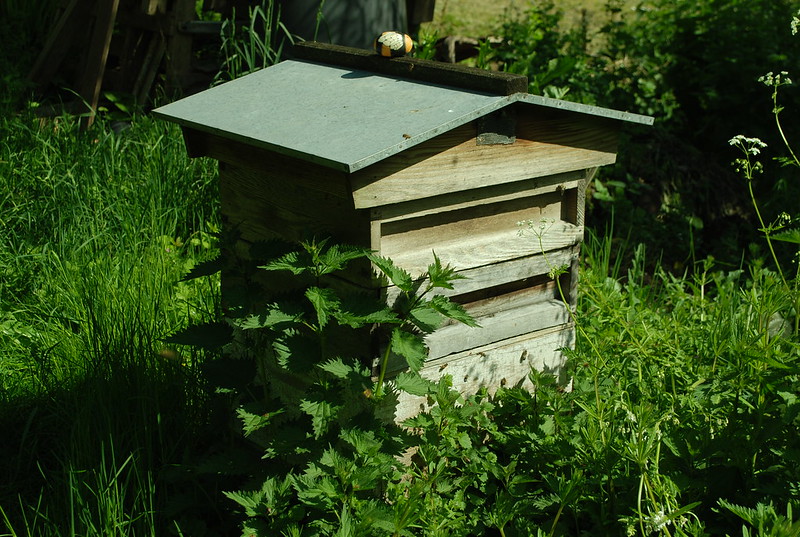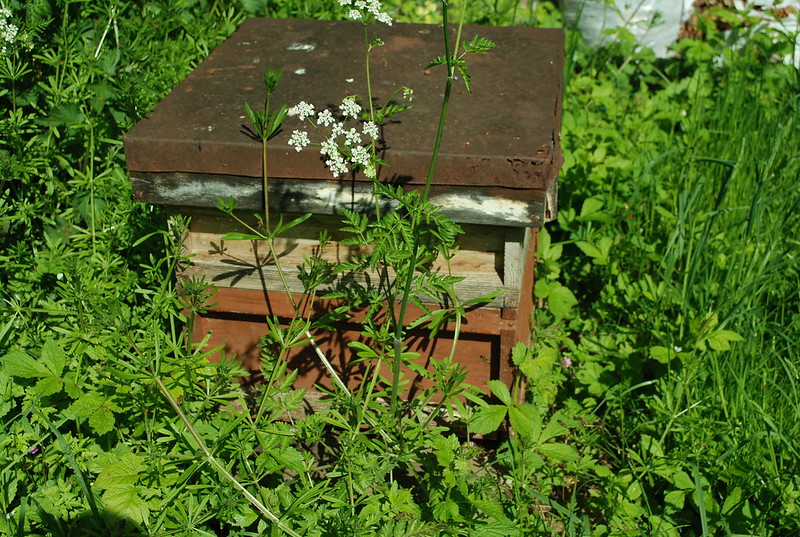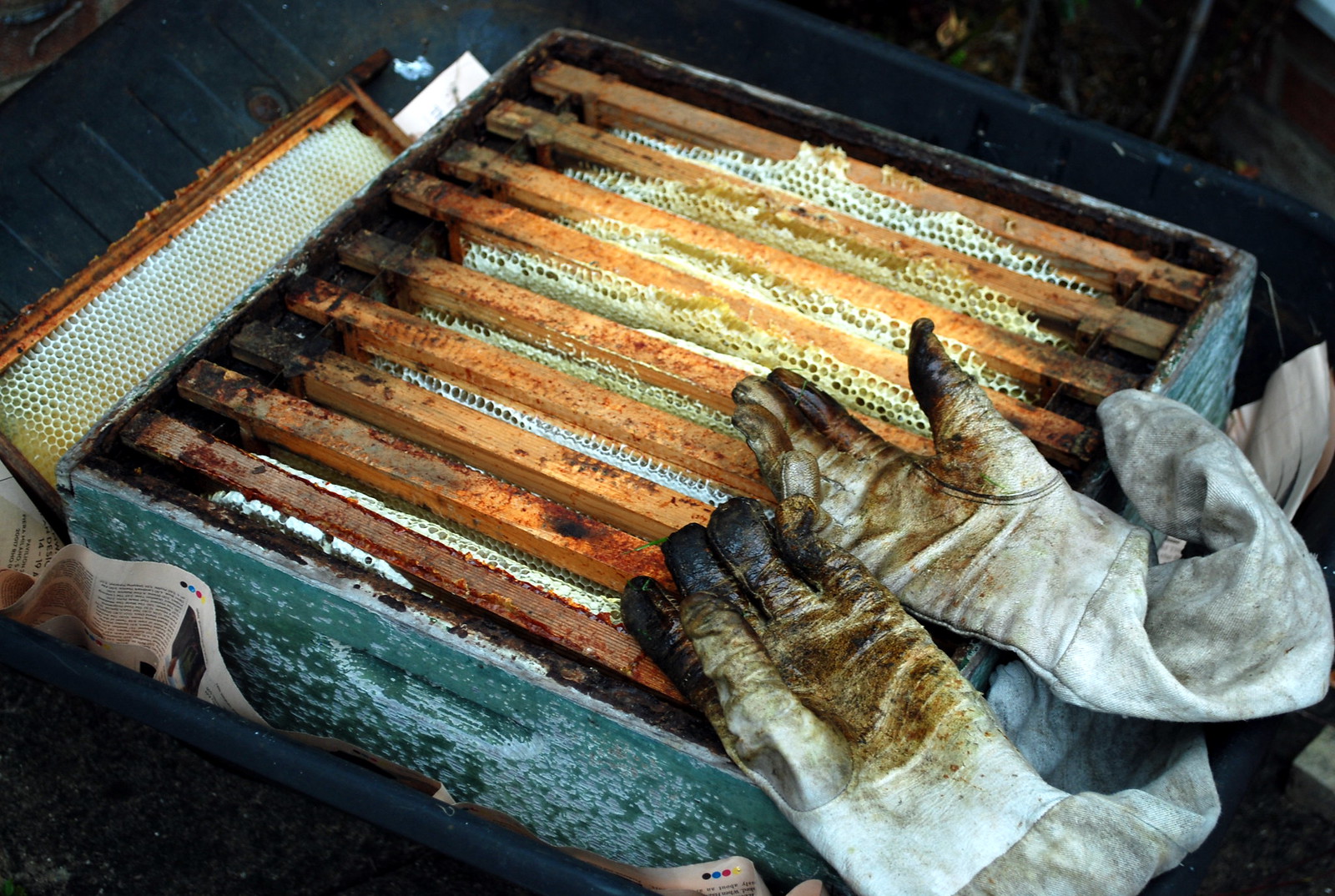At this time of the year, as I cycle past the rape fields (this isn't a reference to some Balkan horror, just the plant), I take note of the dying of the yellow, for it signifies that the spring recolte is once again due. I measure my life by the passing of such seasons: the winter league; tideway, the summer bumps; and the honey harvest. Today was a bank holiday, so after coxing the dev IV and playing at pairs with Paul, I had time for some beekeeping, and planting a magnolia.
Here are the pre-harvest hives. This underplays the degree of weed; task number one was to hack them out of the undergrowth.
Here is the result. Its rather modest, just one super's worth. Note the rather stained gloves; mostly propolis I would imagine. They desperately need renewing; the leather thins, and angry bees would probably have no trouble in getting through. Fortunately today's bees, though provoked, were kind.
The super is from the main (slope-roofed) hive. There is a spare on top, but they haven't filled that. The flat-topped hive survived the winter, much to my surprise, and is now thriving. Alas it has no queen excluder and so is now effectively a brood-and-a-half. They have done a splendid job in filling up empty space with gorgeous comb, but it has an arc of brood across it. I fumbled quite a bit playing with their comb; they were remarkably patient with me.
Speaking of patience, yes I've seen the recent wiki-silliness at WUWT; oh, how we laughed.
Update: one week on
I returned the spun frames. As it happened I gave them all to the flat-top hive, which I did first, and left the slopey hive alone; it was looking rather less vigourous; perhaps it had swarmed. For slopey I pulled out the frames with mixed honey and brood and put them on top of the new queen excluder.
Refs
* Bad Beekeeping, 2014. Which reminds me: I got another roof garden this year.
- Log in to post comments




this isn’t a reference to some Balkan horror, just the plant
In popular academic culture the two are already intertwined.</a.
Meanwhile, back on the pesticide-free windward end of Martha's Vineyard, empty hives and nary an un-wild cherry for lack of pollination
the rape fields (this isn’t a reference to some Balkan horror, just the plant)
There is a reason North Americans call this plant canola.
Rape fields are a visual pop and gift to landscape painters. Someday, when I get over my tech avoidance, I'll have an image to show. And weeds? mmm ...
Speaking as a lifetime Anglophile, I like "rape" in this context (not in others, oops) and would be sad to see them called canola.
Apart from giving landscape painting a lift , rape is a hoot to shoot over -- dull birds like partridge eally stand out above the stuff.
" the recent wiki-silliness at WUWT " On first read I assumed you meant https://en.wikipedia.org/w/index.php?title=Anthony_Watts_(blogger)&curi… but it seems not.
JBL, it is about the Wattsupwiththat entry, not Watts himself
[Don't worry folks, a post is in gestation... -W]
Yes, I found it eventually, and the nonsensical post at WUWT itself. I await WMC's gestating output with bated breath ;).
If anything, the talk page for WUWT is even sillier
https://en.wikipedia.org/wiki/Talk:Watts_Up_With_That%3F
It indeed is silly. The usual complaints about "denier = reference to holocaust!", complaints about Cook, demands the term "skeptic" is used, and so it goes on.
Perhaps some Wikipedia-savvy people should provide quote from a few Tim Ball guest posts on WUWT, and then ask the others why a blog that is supposedly not denialist (as so many of them claim) gladly hosts guest posts by someone who literally denies the greenhouse effect.
Marco, that's what WP calls "original research."
WP has lots of terms that differ from their plain-English meaning. "Original research" means, essentially, looking at facts and interpreting them. You can't do that no matter how obvious the conclusion. Everything has to be based on what "reliable sources" (newspapers, etc) have said about the topic.
So: "WUWT has made insane statements A, B, C through ZZ, showing their denialism" won't fly. You need something like "According to the Hooterville Picayune-Courier, WUWT is a denialist blog."
What really matters on WP are in rough order (1) politeness, (2) tenacity, and (3) numbers of editors on each side. One or two polite, persistent yet badly mistaken editors can tie the place in knots.
Raymond, in that case the comment "Tim Ball, a regular contributor to WUWT, has contributed a chapter to the book Slaying the Sky Dragon which claims to refute the greenhouse theory of man-made warming" should be suitable, correct? Or just refer to the Tim Ball Wikipedia entry?
Marco, unless there's some reliable source* linking Ball to WUWT in the way you propose, that's either synthesis* or OR* or both.
* = word with technical in-Wiki meaning.
So, speaking of resource management, when's the next competition? And has anybody seen my whales?
[We seem to have missed that. My dashboard tells me I have 31,076 comments. Perhaps I'll do a retrospective -W]
and, PS, TW has a good piece here on doing it wrong:
http://www.forbes.com/sites/timworstall/2015/05/29/first-quarter-gdp-re…
Didn't know where else to put this. I know the URL says "weasel", but in the body they admit that it may be a ferret or stoat.
http://thedailywh.at/2015/06/squee-day-mom-weasel-goes-back-smallest-ba…
[Thanks. The correct place for that was http://scienceblogs.com/stoat/2015/03/03/stoat-tastic/ :-) -W]